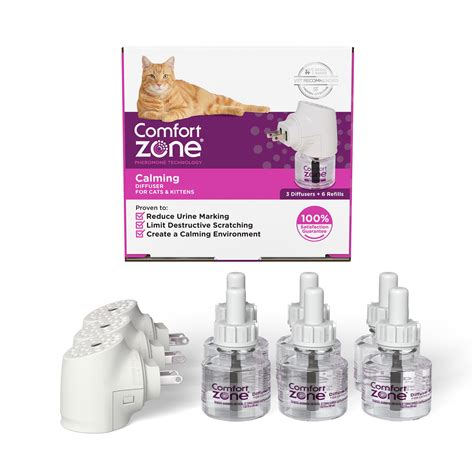Introduction
Providing a comfortable and stress-free environment for our feline companions is paramount. Cat diffusers have emerged as a popular tool to achieve this, boasting a range of benefits such as reducing anxiety, promoting relaxation, and deterring unwanted behaviors. However, selecting the right diffuser and understanding the differences between essential oils and pheromones is crucial.

Essential Oils vs. Pheromones: The Great Debate
Cat diffusers utilize either essential oils or synthetic pheromones to create a calming atmosphere. Each option has its own set of advantages and considerations.
Essential Oils:
- Derived from plants
- Variety of scents available
- Some may have calming or therapeutic effects
- Can be affordable
Pheromones:
- Chemical signals produced naturally by cats
- Mimic appeasing pheromones released by a mother cat
- Specifically formulated for cats
- Effective in reducing stress and anxiety
Choosing the Right Diffuser
The type of diffuser you choose depends on your cat’s needs and individual preferences. Consider the following factors:
- Ultrasonic Diffusers: Use ultrasonic vibrations to disperse essential oils or pheromones into the air. They are quiet and require little maintenance.
- Heat Diffusers: Vaporize essential oils using heat. They tend to be less effective in diffusing pheromones but may release a stronger scent.
- Nebulizer Diffusers: Break down essential oils or pheromones into fine particles for effective diffusion. They are versatile and suitable for both small and large spaces.
Unboxing the Essential Features
When selecting a cat diffuser, pay attention to these essential features:
- Coverage Area: Ensure the diffuser covers the size of your home or the desired area where your cat spends most of its time.
- Diffuser Modes: Some diffusers offer adjustable diffusion modes, allowing you to customize the intensity of the scent.
- Timer: A timer allows you to set specific times for diffusion, ensuring it only operates when needed.
- Light Indicators: Visual indicators help you monitor the diffuser’s status and when it requires refilling.
- Safety Features: Look for diffusers with automatic shut-off functions and child-proof locks for added safety.
Common Mistakes to Avoid
Avoid these common pitfalls when using a cat diffuser:
- Diffusing Essential Oils Directly on Your Cat: Never apply essential oils directly to your cat’s skin or coat. They can be toxic and cause skin irritation.
- Using the Wrong Oils: Some essential oils, such as eucalyptus and tea tree oil, are harmful to cats. Consult with a veterinarian before using any essential oils.
- Over-Diffusing: Excessively diffusing can be overwhelming for your cat. Follow the recommended usage guidelines.
- Ignoring Your Cat’s Reactions: Observe your cat’s behavior after starting to use the diffuser. If they show signs of discomfort or anxiety, discontinue use immediately.
Comparison of Cat Diffusers
The following table compares the pros and cons of different types of cat diffusers:
| Diffuser Type | Pros | Cons |
|---|---|---|
| Ultrasonic | Quiet, economical, easy to use | May not be effective in large areas |
| Heat | Stronger scent, less maintenance | Can alter oil composition |
| Nebulizer | Effective diffusion, versatile | More expensive, may require more upkeep |
Understanding Your Cat’s Needs
To optimize the use of a cat diffuser, it’s important to understand your cat’s individual needs and preferences. Consider the following:
- Age: Kittens and older cats may have different sensitivities to scents.
- Personality: Some cats may be more sensitive to certain scents than others.
- Health Conditions: Certain essential oils or pheromones may interfere with underlying health conditions.
- Environmental Factors: The size of your home and the presence of other pets can influence the effectiveness of a diffuser.
Inspiring New Applications
Beyond reducing stress and anxiety, cat diffusers can be adapted to address various feline-related challenges:
- Encouraging Playtime: Diffusing catnip oil can stimulate playful behavior.
- Curbing Scratching: Placing a diffuser near scratching posts can discourage destructive scratching.
- Improving Sleep Quality: Lavender or chamomile oil can promote relaxation and restful sleep.
- Reducing Litter Box Aversion: Diffusing pheromones near litter boxes can create a more inviting space.
Conclusion
Choosing the right cat diffuser and understanding the differences between essential oils and pheromones is essential in creating a calming and comfortable environment for your feline companion. By carefully considering your cat’s needs and preferences, you can maximize the benefits of these devices and enhance their well-being. Always consult with a veterinarian or animal behaviorist if you have any concerns or questions about using a cat diffuser.





















